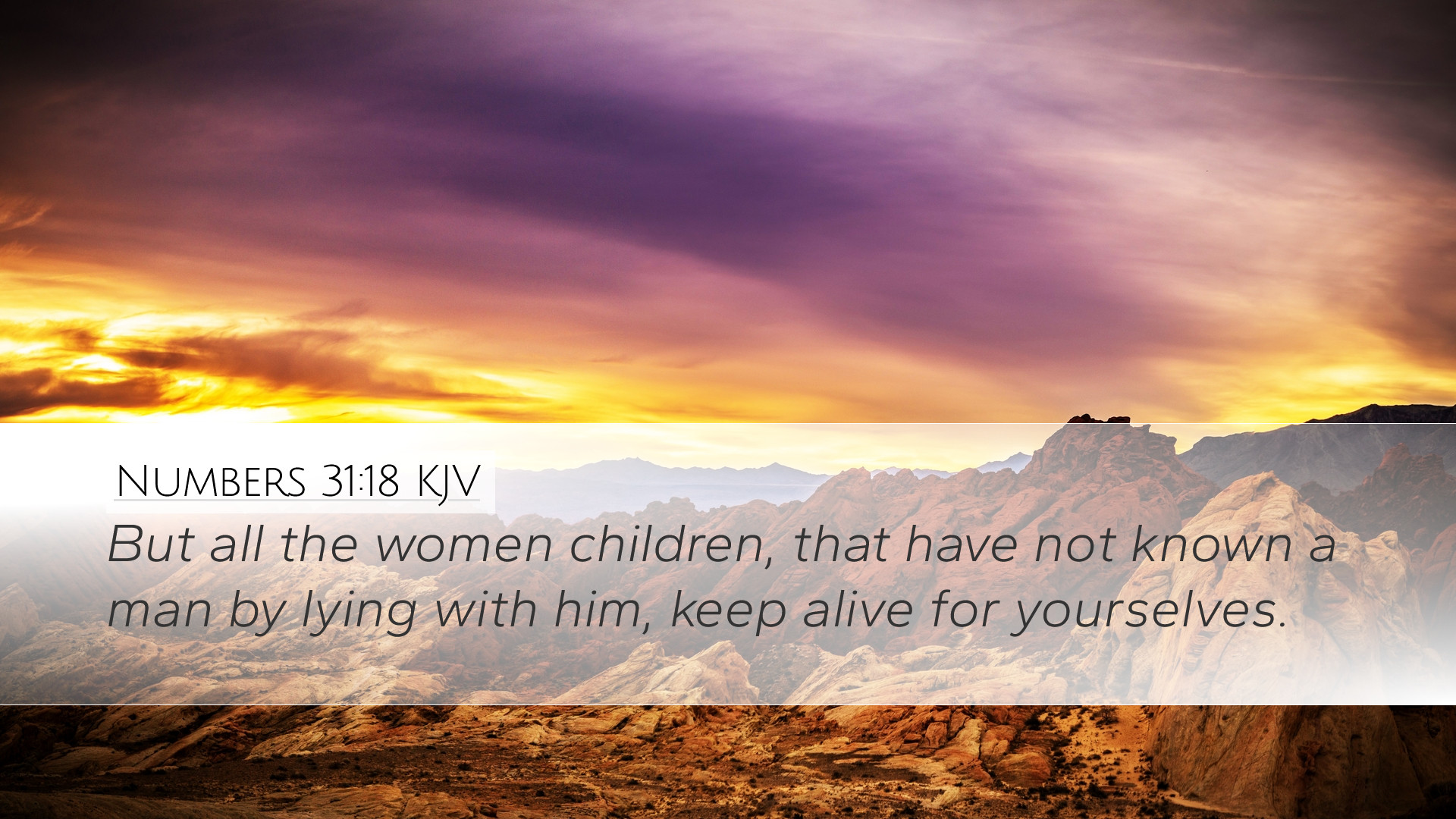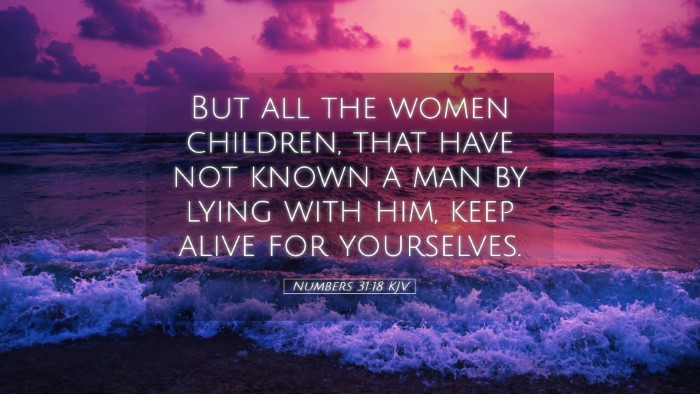Commentary on Numbers 31:18
Bible Verse: "But all the young girls who have not known a man by lying with him keep alive for yourselves."
Numbers 31:18 is a pivotal verse in the context of Israel's conquest of Midian, and it serves as a focal point for discussions on divine instruction, morality, and the implications of warfare in the Old Testament. The verse raises significant theological and ethical questions, particularly concerning the treatment of captives and the nature of God's commands in a wartime setting.
Historical Context
The events surrounding this verse take place after the Israelites have engaged in battle against the Midianites, as instructed by God. This conflict is motivated by the need to address the influence of the Midianites on Israel, especially concerning idolatry and immorality which had previously led Israel astray (Numbers 25). The text thus positions the Israelite army not only as conquerors but also as instruments of divine judgment.
The Command of Preservation
At first glance, the command to preserve young girls raises moral questions, particularly regarding the nature of warfare and its aftermath. Matthew Henry, in his commentary, emphasizes the seriousness of God's command to the Israelites, noting that the preservation of certain individuals could serve a form of redemption for them. While this command might seem harsh, understanding it within the larger narrative of Israel's covenant relationship with God provides a different perspective.
Theological Implications
Albert Barnes offers insight into the theological implications of the verse. He highlights that the preservation of the young women could be seen as an opportunity for their integration into Israelite society, reflecting God's overarching plan for redemption. The inclusion of these women into the Israelite community might also suggest a possible future contribution to the covenant community, challenging patterns of exclusion that can often be found in ancient texts.
Cultural Considerations
Adam Clarke's commentary addresses the cultural practices of the time. In the context of ancient Near Eastern warfare, women were often treated as spoils of war. Clarke posits that the command to protect these young women reflects a deviation from typical ancient warfare ethics, implying an element of mercy amid judgment. He further comments on the possibility that these women would not only survive but would be integrated and married into Israel, thereby transforming their status from captives to members of the covenantal community.
Interpretive Challenges
Scholars often face interpretive challenges with this passage. How should modern readers navigate the ethical implications of such a directive? Pastors and theologians are called to be sensitive to these issues while also seeking a deeper understanding of God's historical actions. This passage stands as a reminder of the complexities inherent in divine commands within a particular historical and cultural context.
As Matthew Henry points out, the faithfulness of the Israelites in observing God's command must also be seen as part of their spiritual discipline. For the Israelite community, the adherence to divine instruction in wartime scenarios served as a form of covenantal faithfulness. This reflects the importance of obedience to God's will as a means of maintaining a right relationship with Him.
Moral Reflections
In reflecting on the moral implications, it becomes vital to consider the broader narrative of redemption found throughout Scripture. The story of Israel is one of both judgment and mercy, intertwined within God's plan for humanity. While the text commands difficult aspects regarding warfare, it also points toward a future hope where injustices are addressed, and individuals are restored.
Covenantal Significance
Ultimately, Numbers 31:18, while challenging, can be understood through the lens of God's covenant with Israel. The preservation of these young women signifies the hope that amidst destruction, life may still flourish and God's intentions can manifest in new ways. It beckons modern readers to consider how God's plan for restoration continues even in the face of human sin and strife.
Conclusion
In summary, Numbers 31:18 is rich with theological, cultural, and moral implications that resonate with pastors, students, theologians, and scholars alike. It challenges us to confront the complexities of God's commands in Scripture, while also holding out the possibility of redemption and inclusion. As we grapple with such passages, let us commit to discerning God's will in our contemporary context, constantly seeking to reflect His mercy and justice in our theological explorations.


